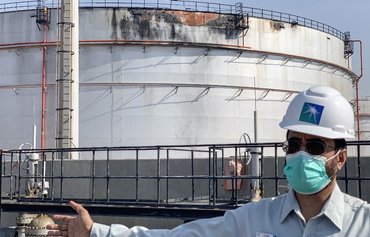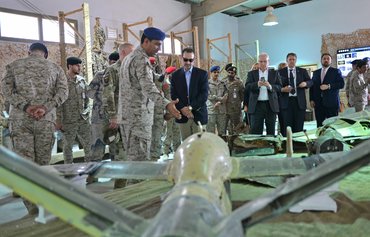Arab and international leaders and organisations have continued to express their solidarity with Saudi Arabia in the aftermath of twin attacks on its oil facilities.
They have spoken out strongly against the September 14th attacks, which have been widely blamed on Iran, and have reiterated their support for the kingdom.
Rather than destabilising the Gulf, which appears to have been the intended objective, the attacks have united the world against the Iranian regime, its Islamic Revolutionary Guard Corps (IRGC) and its regional affiliates.
The attacks on Saudi oil facilities represent "a blatant act of aggression by Iran against the kingdom", said Ninawa tribal spokesman Sheikh Muzahim al-Huweit.
Iran's plans are now "much clearer, namely that it wants to create chaos and fuel violence and turmoil", he told Al-Mashareq, noting that the international community has taken a united and firm position against Iran's malign actions.
Speeches delivered by world leaders at the UN General Assembly on September 24th reflected a common vision centered around condemning the actions of the Iranian regime and its efforts to destabilise the region, he said.
From Iran's perspective, the attacks "failed miserably", he said, as they only "helped reinforce international positions that condemn its hostile actions".
The attacks also affirmed that "international partners, the US in particular, stand with Saudi Arabia and other Arab countries in the face of Iran's ambitions", he added, describing this partnership as both strong and strategic.
International solidarity
The Arab League and the Organisation for Islamic Co-operation (OIC) are among the entities that have condemned the attacks, along with many Arab and international leaders and governments.
Jordan's King Abdullah immediately expressed condemnation for the "cowardly" attacks that targeted the two Aramco oil facilities, the Jordan Times reported.
Egypt and the UAE described the attacks as "acts of terrorism", while Kuwait and Bahrain condemned the attacks and expressed solidarity with Saudi Arabia.
Addressing the UN General Assembly in New York on September 25th, Iraqi President Barham Saleh also condemned the attacks, which he said sought to undermine Saudi Arabia's security.
"Gulf security is vital to Iraq," he said.
Through Saleh, Iraq affirmed that it will not allow its territory to be used as a launch pad for attacks on neighbouring countries or to encroach on their sovereignty, said political analyst Ghazi Faisal Hussein.
Numerous Arab and international leaders have condemned the attacks and denounced Iranian expansionism in the region, he told Al-Mashareq.
The international consensus is to stand firmly against the "Iranian regime's disregard of international norms and treaties and against the threat posed to Gulf security by the IRGC and its militias", he said.
Keeping Iran in check
Hussein noted the participation of UN and French teams in the Saudi investigation into the attacks, saying this is "proof of the international community’s commitment" to ensure full accountability.
The Iranian regime has a long history of meddling in the affairs of the region, he said, adding that "Iran's ambitions and desire to extend its control and export its revolution to the region are not new, but rather longstanding".
Recruiting proxy militias and supplying them with weapons and funds is a key element of Iran's expansionist strategy, he said.
To keep Iran's ambitions in check, he added, it will be necessary to continue to exert economic and diplomatic pressure on the Islamic Republic, especially if it does not change its policies and comply with international resolutions.

![Saudi Aramco's Abqaiq oil facility is seen here on September 20th. The strikes on the Abqaiq and Khurais oil facilities roiled energy markets and revived fears of a conflict in the Gulf region. [Fayez Nureldine/AFP]](/cnmi_am/images/2019/10/10/20363-Saudi-Abqaiq-Aramco-600_384.jpg)






